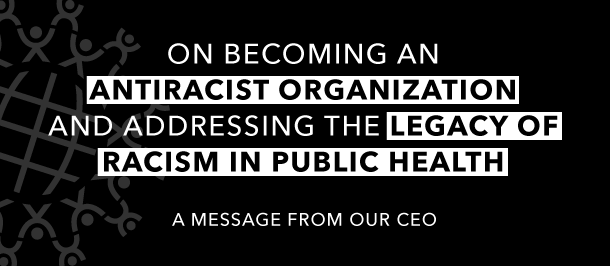Where We Work
See our interactive map


We have a long road ahead. These are some of the steps that will get us there.
The murders of George Floyd, Breonna Taylor, Ahmaud Arbery, and other Black Americans—on top of generations of systemic oppression and trauma in the US—are unacceptable. They should not and cannot be normal. My colleagues at IntraHealth International and I are outraged and anguished. Most of all, we are determined to act.
So we’re taking a good, hard look at ourselves. We’re an organization that’s committed to equality, equity, justice, and respect. We staunchly oppose racism. But we’re seeing that we have a long way to go toward becoming the antiracist organization we strive to be.
Here are some steps we’re taking:
These are only a start.
Too often, Black Americans’ rights to high-quality health care are not honored. The ideals of public health have not served them as they have white Americans. For example:
This is a loathsome betrayal of the trust we put into our health policymakers and systems. The effects of racism on public health have never been clearer.
We have to actively fight against systemic racism to be truly antiracist.
Many of our issues with racism in the US are unique to our country, shaped by over 400 years of slavery, Jim Crow laws, mass incarceration, and more. But racism is a global system that affects all fields, including international development. US-based global health organizations like IntraHealth risk exporting our racism overseas with every flight we take and inflicting it on our partners and stakeholders—the very people we are meant to serve.
As a US-based organization that works primarily in African countries, we cannot ignore the inherent issues of race, power, and imperialism in the work we do every day. We have to be part of decolonizing global health and demand that our funders do the same.
My kids grew up in Africa. They went to diverse international schools. They are half Moroccan Berber. So when we first started talking about the news and the protests a few weeks ago, they were shocked. They thought there was no way they could be part of the systemic racism that has existed in the US for generations.
But the more we talk about overt and covert racism, and the history of our country, the more they realize it’s not enough to not contribute to the problem. We have to actively fight against systemic racism to be truly antiracist.
This is what we’re working toward at IntraHealth. If we’re going to make our vision a reality—and ensure that everyone everywhere has the health care they need to thrive—we cannot be silent. We need to act.
Get the latest updates from the blog and eNews




